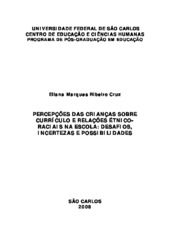Percepções das crianças sobre currículo e relações étnico-raciais na escola: desafios, incertezas e possibilidades
Abstract
The present research had as objectives to understand how children perceive, in school, the ethnical-racial relations by means of the experienced curriculum and to present some methodological suggestions on the pedagogic treatment of the referred theme/problem, inspired especially on inter/multiculturalism. The data collecting was performed with 14 (fourteen) children who, in the year of 2007, were part of a fourth grade public school class in the city of São Carlos. Individual and group interviews were performed, always having as main focus the curriculum lived by them and the ethnical-social relations. On the first phase of individual interviews, the children showed their perception about a situation that I read to them, which involved prejudice, discrimination and racism in an imaginary classroom. On a second moment, the children informed their knowledge about the concepts of prejudice, discrimination and racism, relating them to the case that was read and explaining where and how they learned (or not) about such concepts. On the third moment, I asked the interviewed children to describe a real situation, occurred in school, lived or not by them, which involved the concepts of prejudice, discrimination and racism. At last, it was proposed to them that they express their opinion about what and how the situations of racism, prejudice and discrimination taken place in school should be treated. The second phase of the research intended to deepen aspects related to the learning of the school contents by the children. For that, group meetings were conducted, in which after visualizing images picturing scenes of Brazilian History, the children expressed which school learning emerged from those images. The images used were A primeira missa no Brasil , by Victor Meirelles, Mercado de Escravos , by Johann Moritz Rugendas and Inspeção de Negras recentemente chegadas da África , by Paul Harro-Harring. The analysis showed that the children experience the curriculum in a conflicting and contradictory way. They hear a speech of equality, but live situations of inequality on the interpersonal relations that take place in school. They also indicate tensions and contradictions between equality and difference, as well as the influence of the speeches produced inside and outside school. The interviewed children conveyed that they clearly perceive the situations of prejudice, discrimination and racism that happen inside school, transforming the differences, especially referring to color/race, in inequalities. The analysis revealed that the children s mental representations about the indigenous and African people are still close to those from the colonization times. However, they perceive the injustice and inequality imposed to those people during colonization and that they still persist on present days. This research evidenced that it is necessary to rethink and (re)build the pedagogic practices, as well as the curriculum. However, this (re)building requires public policies that are more than equality speeches and the reformulation of the curriculum for initial and continuous teacher formation, including, in a critical way, the theme/problem of ethnical-racial relations in school. Finally, this study showed as possibilities the use of images, interviews, listening and dialoguing with the other students, as a way of denaturalizing, criticizing and (re)creating other new relations based on equal treatment and that do not transform differences in inequalities.
